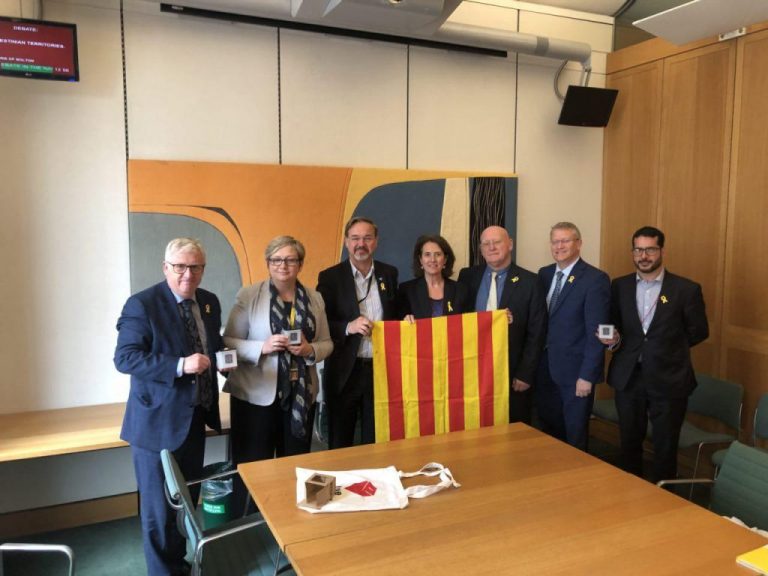
The President of the National Assembly, Elisenda Paluzie, reviewed on June 7 the current situation in Catalonia with members of the APPG (All-Party Parliamentary Group on Catalonia), a number of British MPs who set up this work and study Group to develop links between the two territories, to monitor the Catalan conflict and to keep updated on developments in Catalonia.
The session, attended by about twenty Members of Parliament from various political parties, was held in the British Parliament in Westminster. There, Paluzie reviewed Spain’s grievances with Catalonia, and placed the current moment in the context of the events of recent years.
A very intense afternoon
Paluzie took advantage of the meeting to explain the intensity of events last autumn, with the pro-independence victory in the referendum, and the consequent declaration of independence which, after “internal pressure” and “divisions” inside the Government, was voted on in Parliament, but was not “implemented”.
Paluzie also spoke of the escalation of repression by the State with searches in several Government Ministries and departments, which ended, days later, with the arrest of Jordi Sànchez, then President of the Catalan National Assembly, and Jordi Cuixart, President of Omnium Cultural, accused of sedition, in spite of having dissolved the gatherings that had formed spontaneously in front of them, by asking everyone to go back home.
These, however, are not, by any means, the only reprisals of the State. There are currently nine political prisoners (members of civil society and the Government) and seven other people, former members of the Government and of Parliament, exiled to various parts of Europe. In fact, Paluzie recalled that the Supreme Court intends to judge all the accused, both political prisoners and those in exile, in the same court case.
Finally, she also spoke about future challenges and scenarios, with pending extraditions to be judged, the creation of the Council of the Republic, the 2019 local and European elections, and also the setting up of the new Spanish Government. In the latter case, Paluzie was “sceptical of any change”, especially after seeing the kinds of ministers appointed, some of whom are very belligerent over the Catalan question, such as Josep Borrell, who called for the “disinfecting” of the wounds that, according to him, the process has caused, before stitching them.
She also explained the reason why the pro-independence parties had voted in favour of the motion of no-confidence, despite not expecting any change. “To support the main culprit of all that has happened would not have been understood.”
International window
During her institutional visit, Paluzie also took part in two more debates, one in Cambridge, and a second one in London, where she shared an idea that she had already shared in Westminster: the importance of international solidarity for raising European public opinion awareness that “there are political leaders in the European Union that are facing the threat of more than 30 years in prison for having organized a self-determination referendum.”
At the London debate, accompanied by former Generalitat and Diplocat foreign affairs officials, by former Minister Clara Ponsatí, and by parliamentarians, Paluzie called for the trial against the political leaders due to be held this coming autumn to become a new Burgos trial, to “raise the awareness” of international public opinion and to display the violations of rights being suffered by the Catalans, in order to be able to explain Catalonia’s need for independence more clearly.
You can find a video of the session “Report on Catalonia” on our YouTube channel
You can find more information about APPG for Catalonia here